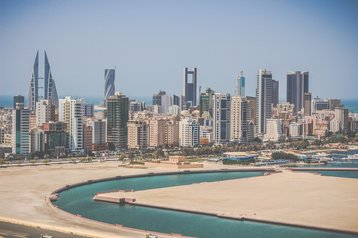Telecoms company Viva Bahrain has opened a new data center in the region to offer colocation services.
Viva is a wholly owned subsidiary of the Saudi Telecom Company Group, the largest telecommunications company in the Middle East and Africa (MEA).
A desert island
“At Viva Bahrain, we are committed to invest in state-of-the-art ICT technologies and advanced IT infrastructures, which can support and empower our business customers and contribute to the development of the Kingdom at large,” Ulaiyan Al Wetaid, VIVA CEO said.
“In launching Viva Business data center, we ensured that it abides by Viva’s high-quality standards and delivers on our promise to provide effective and cost-efficient ICT solutions to our business customers.”
The company said the data center was built ’to Tier III standards.’ The opening comes after several other data centers were opened in Bahrain, including a Cisco data center in 2008 and a Kuwait Finance House data center in 2012.
With 92.7 percent of its 1,378,904 population having an Internet connection, Bahrain is the most connected country in the Middle East. However, that penetration has a dark side, with the Kingdom using surveillance and spyware tools like FinFisher from UK firm Gamma International to spy, track and discredit activists. The 2015 hack of Italian company Hacking Team revealed that it too was providing the nation with highly-sophisticated cybertools.
A crackdown on dissidents has led human rights activist Nabeel Rajab to claim in The New York Times that the country had some 4,000 political prisoners, and the highest prison population per capita in the Middle East. He wrote the article from jail in Bahrain, after being arrested for his work, and for several Tweets.
The US has called for Rajab to be released, while others have cited an Amnesty International report on continued human rights violations, but it is likely that international condemnation or sanctions will remain muted.
The United States Fifth Fleet and the US Naval Forces Central Command are headquartered in Bahrain, serving as the superpower’s regional base, covering the Persian Gulf, Red Sea, Arabian Sea, and some of the Indian Ocean. F-16 and F/A-18 fighters and P-3 surveillance planes are also based at Isa Air Base in the southeast of the island.
Foreign policy makers have often viewed close relations with Bahrain as a necessary price to have a strong military presence in an unstable region where relations with Iran remain fraught, and Islamic State continues to hold territory.
After the violent suppression of protesters during the Arab Spring, the US temporarily suspended security aid, but a few years later this decision was reversed, with the US government saying that Bahrain had made “meaningful progress” on human rights - despite the State Department saying human rights remained inadequate.
Earlier this month the Commander-in-Chief of the Bahrain Defence Force (BDF), Field Marshal Shaikh Khalifa bin Ahmed Al Khalifa, met with the US Ambassador to Bahrain, William Roebuck, and the US Military Attaché to the Kingdom, where he lauded relations, particularly in the military field.
The UK has similar ties to the country, with a major military port for the UK fleet currently under construction. The Mina Salman Port will be the UK’s first permanent Middle East base for 40 years, with the $23m (£15m) cost primarily being paid by Bahrain.
Late last year, then-UK Foreign Secretary Philip Hammond said: “The beginning of construction work at Mina Salman Port marks a watershed moment in the UK’s commitment to the region. The presence of the Royal Navy in Bahrain is guaranteed into the future, ensuring Britain’s sustained presence east of Suez.”
Today it was announced that The Prince of Wales and Duchess of Cornwall will visit Bahrain on behalf of the UK government. Clarence House said: “The tour will help to strengthen the United Kingdom’s warm bilateral relations with key partners in the region.”

